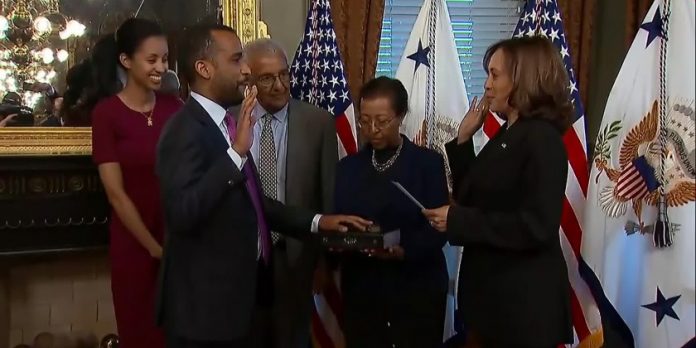Ambassador Abraham’s new mandate in ASEAN, at these most challenging of times, will be extremely vital. He must cultivate strategic trust, and balance the interests of ten diverse countries against the U.S.’ vested interests in the Indo-Pacific.
Yohannes Abraham, the new United States Ambassador to ASEAN, presented his Letter of Credence to the Secretary-General of ASEAN on 5 October 2022, after a five-year hiatus since the previous Ambassador, Nina Hachigian, left in 2017. Abraham is a former Chief of Staff of the National Security Council. President Biden, while announcing his appointment during the ASEAN-U.S. Special Summit on 13 May 2022, commissioned Abraham to be a “trusted representative to continue deepening this critical partnership” with ASEAN.
This came after four years of neglect by the Trump Administration when the U.S. was represented by a total of five charge d’affaires — head of a diplomatic mission serving in the absence of an ambassador — in the Mission to ASEAN in Jakarta. Notably, the U.S. was the first non-ASEAN country to appoint a resident ambassador to ASEAN in 2010. Trump’s disdain for multilateralism and lack of interest in ASEAN were clearly evidenced when he attended the 2017 annual summit with ASEAN but skipped the rest during his presidency, even the virtual one in 2020.
The Biden administration has shown a renewed commitment to Southeast Asia. The restoration of ambassadorship to manage ASEAN-U.S. relations follows on swift appointments of ambassadorial vacancies in the region, including Brunei, Philippines, Singapore, Thailand, and Vietnam. Team USA has returned to full force in conveying Washington’s messages to a bloc that is at the heart of the Indo-Pacific — an arena vital to the U.S.’s national security.
Since taking office, Biden has lost no time and seized every opportunity to catch up on the years of neglect through a series of high-level visits to Southeast Asia involving Vice-President Kamala Harris, Secretary of State Anthony Blinken, Defense Secretary Lloyd Austin, and Commerce Secretary Gina Raimondo, among others. These diplomatic overtures culminated in the ASEAN-U.S. Special Summit in Washington, DC in May 2022.
Ambassador Abraham will not be starting on ground zero in rebuilding relations with ASEAN. However, he has a huge task ahead as he prepares for Biden’s second meeting with ASEAN leaders next month in Phnom Penh. The U.S. is conscious that now is the opportune moment to increase its standing with ASEAN as both sides commemorate the 45th year of dialogue relations. Ambassador Abraham will be negotiating for a Comprehensive Strategic Partnership (CSP) status with ASEAN to be announced through a Joint Leaders’ Statement at the Summit. The U.S. is hoping to be the third dialogue partner to be accorded this preferential status after China and Australia received it last October.
It will be an arduous journey to turn political ambitions and pronouncements into reality and actions. ASEAN needs to ensure that the U.S.’s objectives are aligned with the bloc’s interests and priorities.
ASEAN claims that the CSP does not denote an elevation of partnership; entering into the CSP may be viewed as a political decision rather than one that entails mutual agreements and obligations. Nonetheless, the CSP decidedly facilitates greater strategic alignment between ASEAN and the U.S., including the U.S.’s support for ASEAN’s implementation of its Outlook on the Indo-Pacific (AOIP) through new or enhanced areas of cooperation. Signalling the U.S.’s enhanced commitment to the region and to relations with ASEAN, President Biden announced an additional US$150 million to support a dozen new cooperation initiatives during the ASEAN-U.S. Special Summit in May.
These initiatives will include new ministerial-level meetings on climate and environment, energy, health, transportation, and women’s empowerment, as well as regional maritime security initiatives (amounting to US$60 million) such as the expansion of U.S. Coast Guard cooperation and training. The Special Summit also resolved to foster cooperation in sustainable infrastructure (with US$40 million pledged), economic futures, digital integration, health security, education, and youth engagement.
The long list of new activities will not be a walk in the park for the new ambassador. It will be an arduous journey to turn political ambitions and pronouncements into reality and actions. ASEAN needs to ensure that the U.S.’s objectives are aligned with the bloc’s interests and priorities. This means that the U.S. will need to undertake dozens of consultations with various sectoral bodies within ASEAN and the Committee of Permanent Representatives to ASEAN if these initiatives are to benefit all ASEAN members inclusively through regional mechanisms.
With countries’ foreign policy continually shaped by bilateral relations, initiatives for ASEAN that are driven unilaterally by the U.S. and implemented selectively with individual countries will not bode well for ASEAN as an institution. In fact, a cherry-picking style of cooperation within ASEAN — Myanmar aside — will only further divide the regional bloc that is already strained by the U.S.-China rivalry. The Indo-Pacific Economic Framework (IPEF) is an example of the U.S.’s preference for working with like-minded countries to the exclusion of others in ASEAN, namely Cambodia, Laos, and Myanmar.
Ambassador Abraham’s new mandate in ASEAN, at these most challenging of times, will be extremely vital — and distinct from the other bilateral ambassadors in the region. He must cultivate strategic trust, and balance the interests of ten diverse countries against the U.S.’s vested interests in the Indo-Pacific. With China’s growing influence in the region, ensuring unanimous buy-in from the ASEAN-10 will be Ambassador Abraham’s biggest challenge yet.
Notwithstanding the importance of alliances in U.S. foreign and security policy, the U.S.’s inclusive engagement with ASEAN will be important to promote regional unity and prevent fractures in the grouping due to parallel or competing alliances. Importantly, ASEAN will welcome a stance that does not compel the organisation to choose sides in global geopolitical contests./ BY JOANNE LIN/ FULCRUM




